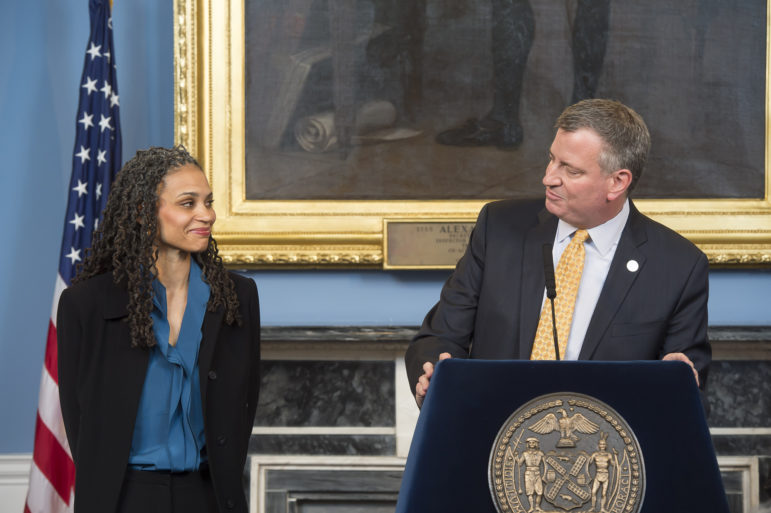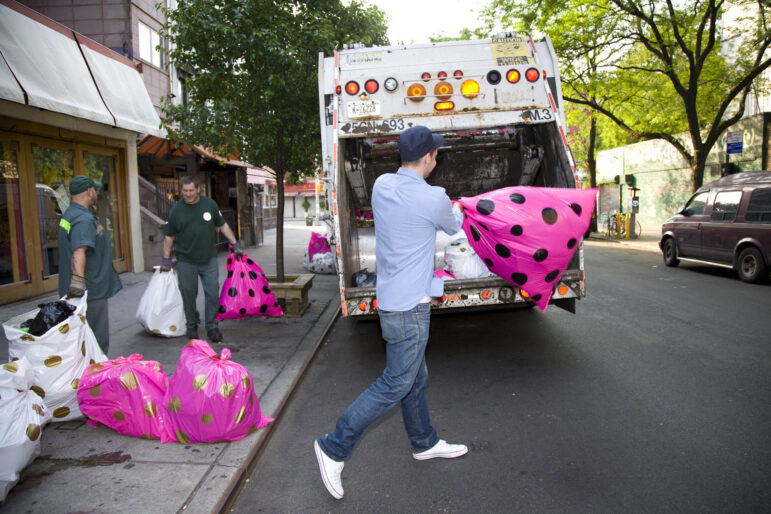
Rob Bennett for the Office of Mayor Bill de Blasio
Mayor de Blasio seen in 2014 as he welcomed Maya Wiley, then his counsel and now head of the CCRB, to his administration.
When former mayoral counsel Maya Wiley was tabbed to head the Civilian Complaint Review Board this month, was there any hope that it wouldn’t trigger another neck-bulging rant from police union boss Pat Lynch? Wiley is, on paper, a child of the left. He father is well-known civil rights activist George Wiley, who headed up the National Welfare Rights Organization and once landed on a master list of Richard Nixon’s political enemies. After Wiley’s untimely death in 1973, his daughter went on Dartmouth College, the American Civil Liberties Union and the NAACP Legal Defense Fund.
Very much like Richard Emery, the prior CCRB head with links to the NYCLU (but who left amid scandals and opposition from police unions), Wiley would appear to have a civil rights background. That might sound promising for reform-minded people. But will she hold the police department accountable? Don’t hold your breath.
Apart from the police union’s continued strategy of pushing the political goalposts to the right by insisting everything City Hall does is anti-police, Lynch did however make a genuine point: The CCRB’s independence is a joke. Emery, who c0-organized a fundraising event for Mayor Bill de Blasio in the West Village shortly before he was appointed, was also an attorney and advisor to NYPD commissioner Bill Bratton. Emery’s son works for the NYPD, answering to Bratton and counterterrorism chief John Miller.
While the Emery era was a pretty incestuous arrangement from the start—one that favored the NYPD (despite the clamoring of police unions)— is Wiley’s move from City Hall to the country’s largest police oversight agency more of the same? Her appointment suggests that the CCRB has more to do with politics than actually discipling cops. Speculation that Wiley’s exit from City Hall was a byproduct of turmoil at the mayor’s office over pay-t0-play allegations and shady donors (who’ve coincidentally made top NYPD brass their personal assistants) suggest a political reshuffling of the administration. The added benefit for the administration, amid continued national outcry for police reform, is being able to claim that it has once again installed another erstwhile progressive, “civil rights” figure to head the CCRB. And Wiley is black, which undoubtedly will figure into the political equation at some point.

No Backspace is City Limits’ blog featuring a recurring cast of opinion writers passionate about New York people, policies and politics. Click here to read more..
The outcry from the police unions, for the casual observer, would seem to confirm that progressive packaging. It’s all rather safe politics for the administration, in fact. But what do these types of appointments mean in practice?
Emery, the prior “civil rights” CCRB chair, tried to move the “independent” watchdog toward a collaborative posture with the NYPD, a direct conflict with even the most basic interpretation of independence. He regularly met privately with Bratton, his longtime friend, and moved to push CCRB investigations towards mediation, a scenario where people who file complaints sit down with the cops they’ve accused of misconduct and come to some sort of “resolution” face to face, sparing the accused officer of any punishment. Last year saw the highest number of mediation attempts in the agency’s history. Civilian complainants were offered mediation by the agency 1,768 times, up from 1,428 in 2014 and 1,088 in 2013 before Emery arrived. What are essentially handshake agreements with cops allow the agency to check off investigations from their backlog of complaints, claiming efficiency. They also help provide the statistical framework for City Hall to show less overall police misconduct. Everyone wins! With Wiley’s connection to de Blasio, it’s hard to imagine the agency would diverge from that approach.
Zooming out, one can also asses the big picture politics of police oversight. For starters, city politics have always been baked into the bread of the CCRB. Board members are political appointments. The Council chooses five members, one from each borough. The police commissioner chooses three, all of whom are former cops nearly as defensive of cops as Pat Lynch is. I can vividly remember past CCRB meetings where Tosano Simonetti, a since-gone Bratton appointee and former commander of the 120th precinct, vehemently opposed anything even scented with police accountability. The mayor chooses the remaining five board members, including its chair. With de Blasio repeatedly saying he and Bratton are “joined at the hip”, mayoral appointees shouldn’t be expected to cross the police commissioner’s office.
This brings us to the most fundamental and important figure in how the CCRB works: the police commissioner.
The CCRB, despite its veneer of being an independent watchdog, has only advisory power when it comes to discipling cops. The final say belongs to the police commissioner. Early on into the de Blasio era, the New York Times reported that Bratton had been declining to discipline cops in cases where the CCRB had recommended it do so. Bratton’s no-discipline decisions came at about the same rate, 25 percent of cases, at which Ray Kelly thumbed his nose at the agency during the Bloomberg administration. Bratton explained that CCRB was “overcharging and overpenalizing” officers. In other words, the agency’s investigations were secondary to what the head of the department it’s supposed to oversee ultimately determines. Emery himself at times patted himself on the back for working out agreements with Bratton privately.
But there’s also a double swipe for complainants and activists who’ve dealt with the agency. In many cases, when the CCRB does substantiate misconduct and ask for discipline, their recommendations are laughable. In 2014, for example, a pregnant Colombian woman, Sandra Amezquita, was pushed to the ground by cops in Sunset Park. The CCRB launched an investigation and found there to be misconduct. There was video of the high-profile incident so this finding was hardly a bold step by the agency. However, it was the agency’s recommendation that angered Amezquita, her lawyer and her supporters: The police officer would be “docked up to five vacation days.”
Five days for knocking a pregnant woman to the ground. That’s the discipline the country’s largest police oversight agency recommends.
The CCRB is many things: a political ploy meant to provide the illusion of accountability, the police commissioner’s red-headed step child, the police union’s favored punching bag. One thing it’s not is an effective oversight agency. It produces long reports and holds monthly public meetings that meander on about the minutiae of administrative busy work. At this point it is essentially a waste of time and resources. It’s probably best to shut it down and start over from scratch, with elected board positions and, most importantly, with final say on discipline.
Other cities around the country, like Newark, have made the mistake of modeling newly-created watchdog agencies after the CCRB. They think that the agency’s approach is a step towards police accountability. Real New Yorkers should know better.










2 thoughts on “No BackSpace: Civilian Complaint Review Board Staggers On”
Excellent! Thank you for this.
Good analysis, but the author is mistaken about Newark. Newark’s CCRB is decidedly not modeled after New York City’s–in many ways its modeled to avoid New York City’s problems. More research before making that claim here would have been a better approach than making a conclusion without research.